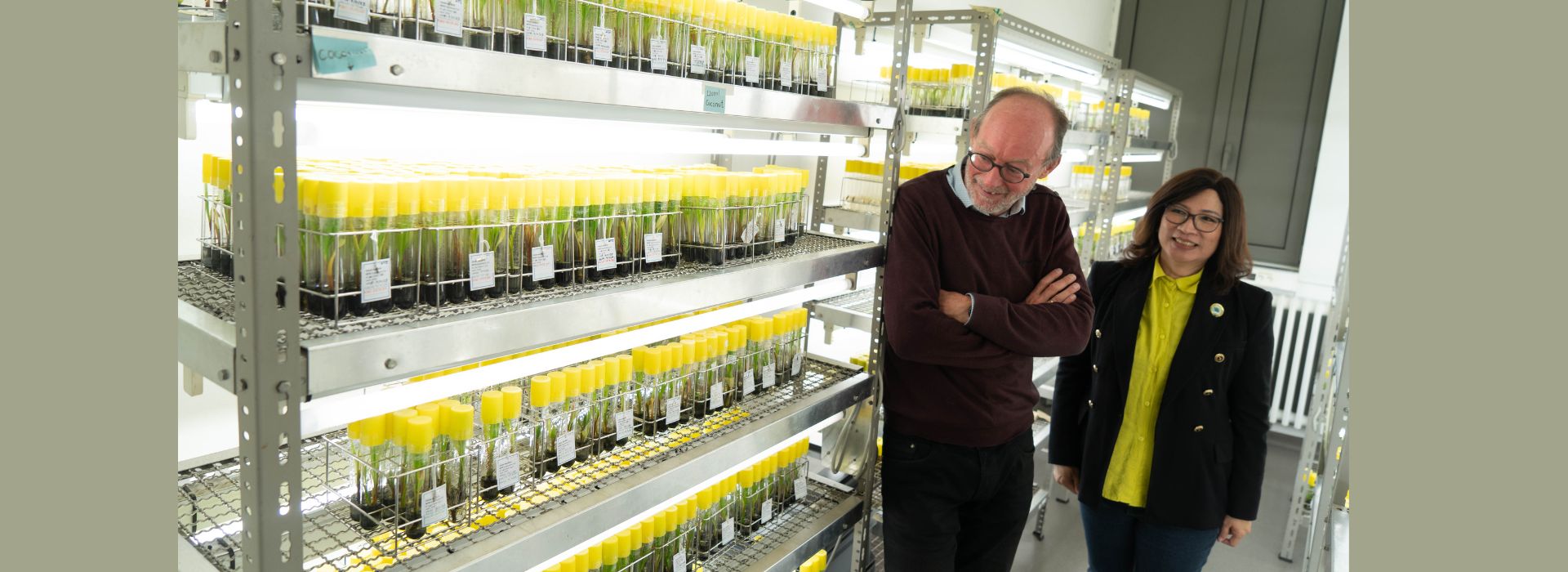Leuven, Belgium, 25 September 2025 – Dr. Jelfina C. Alouw, Director General of the International Coconut Community (ICC), visited the Alliance Bioversity & CIAT, Tropical Crop Improvement Laboratory at Katholieke Universiteit Leuven (KU Leuven)’s Department of Biosystems. She was invited and welcomed by Dr. Bartholomeus Panis, one of the world’s leading experts in banana and tropical crop biotechnology, including coconut, and the Manager of the Banana Genebank.

Dr. Panis served as one of the main resource speakers for the ICC International Tissue Culture Training in 2022, where his methodologies inspired young researchers across ICC member countries. Several success stories have since emerged, including Vietnam’s progress in applying Dr. Pannis’s approach to coconut clonal propagation.
At KU Leuven, Dr. Jelfina was introduced to the banana genebank, one of the world’s most significant collections, housing around 1,700 banana accessions. The majority are edible bananas, with the remainder consisting of wild types crucial for breeding and resilience. The world collections at KU Leuven, officially known as the Bioversity International Musa Germplasms Transit Centre (ITC) serves as the globe’s largest and most crucial repository of banana diversity. The initial transit role was to facilitate the safe, global exchange of banana germplasm. Because bananas are prone to pests and diseases, the ITC developed as system for indexing its accessions for viruses. Only accessions indexed as virus-free are distributed, making it a globally safe source of healthy planting material. Accesssions are conserved in vitro (in test tube) under slow-growth conditions to minimize growth and prolong storage. Critical accessions are secured via cryopreservation (freezing in liquid nitrogen), which can preserve the material indefinitely. A full backup collection is also stored in Montpellier, France, to ensure long-term security. The ITC has expanded its influence beyond just conservation and safe distribution, effectively play significant roles as a global reference centre for Musa genetic resources. It distributes thousands of samples annually to researchers, breeders, and farmers in over a hundred countries. All materials are shared under the terms of the Multilateral System of Access and Benefit Sharing of the International Treaty on Plant Genetic Resources for Food and Agriculture (ITPGRFA), ensuring the materials are freely available for research, breeding, and conservation.



Leveraging the laboratory’s expertise, Dr. Panis has applied his skills to the development of coconut tissue culture protocols, notably the new methos based on axillary shoot formation referred to as COAXIM (COconut AXIlliary Meristem). This method represents a significant breakthrough, enabling the mass clonal propagation of desired varieties. His team has achieved successful regeneration of shoots and the growth of small plantlets in vitro, demonstrating that advanced biotechnology platforms developed for banana can also support coconut clonal propagation. Current experiments show that thidiazuron (TDZ) is the most effective growth regulator, with high proliferation rates in both dwarf and tall coconut varieties. The method, which combines shoot cutting with hormone treatment, enhances axillary shoot formation.
Further breakthroughs were noted in embryo rescue techniques, achieving 96% regeneration rates and allowing rooted coconut plants to be established from embryos. This addresses long-standing challenges with decontamination and in vitro culture, representing a significant step forward in coconut biotechnology.
The main purpose of Dr. Jelfina’s visit was to exchange experience on plant genetic resource management, particularly the banana genebank operation, and to explore collaborative opportunities in coconut tissue culture between ICC and the Alliance Bioversity & CIAT to further optimize the technology for commercialization. Dr Jelfina expressed gratitude that this robust ITC system, including the implementation of germplasm indexing and in vitro clean-up, could be adapted for coconut. This is crucial because a main concern in the germplasm exchange of coconut is the transmission of systemic lethal pathogens, particularly phytoplasma. The beauty of Dr. Panis’s objective is to make the tissue culture plants affordable under smallholder farmers. . The visit also served to foster broader scientific and institutional linkages.
Joining the discussions was Mr. Jan Oprins, Commissioner of Bambu Nuwa Verde (Yogyakarta, Indonesia), who also toured the laboratory to see firsthand the practical applications of Dr. Bart’s technology.
Dr. Jelfina emphasized ICC’s commitment to advancing coconut conservation and propagation technologies, noting that partnerships with leading research institutions such as KU Leuven are vital to supporting member countries in achieving sustainable and resilient coconut production systems.

